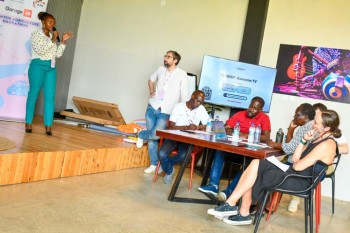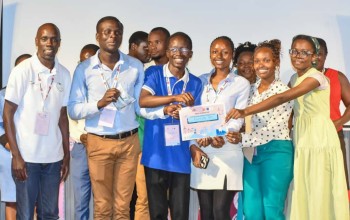University of Eldoret’s Susan Maina (COM/003/21), a student from the Department of Computer Science and Mathematics, has distinguished herself on the national stage by leading a team that won Second Place at the Tech for Agriculture Hackathon 2025, held in Kisumu from 6–8 November 2025. The hackathon was a high-intensity, 48-hour prototype-building event organised by Garage48, AfriFortified, and partners from Estonia, bringing together innovators from across Kenya to develop technology solutions for some of the country’s most pressing food and farming challenges.
The theme of the hackathon was “Hacking the Future of Food and Farming in Kenya.” Participants were challenged to form teams and build functional prototypes addressing real problems in at least one of five key areas: Sustainable farming and climate resilience, Food innovation and post-harvest technologies, Market access, traceability and logistics, youth engagement and employment in agri-tech, financial inclusion and farmer education. Within just 48 hours, teams were expected to move from an idea to a working prototype backed by a viable business model.
Ms. Maina participated in the Hackathon as part of “Farmula1” Team, which developed an AI-driven agricultural intelligence platform. Farmula1 is an autonomous, AI-powered monitoring system described as the “AI Eye for Agriculture.” The team focused on a critical pain point in the tomato value chain: the farmer’s “blind spot” when it comes to fast-spreading diseases like Late Blight, which can devastate up to 100% of a harvest in a matter of days. The platform uses strategically installed cameras across the farm to scan tomato fields 24/7. An AI model analyses the visual data in real time to detect disease early – identify early, mid, and late stages of tomato blight; Estimate potential yield loss – quantify the percentage of the crop at risk and the likely financial impact; and trigger automated action – send instant alerts and clear action plans to the farm manager.
The team framed a problem that affects multiple actors in the ecosystem: Farmers: Receive instant, automated diagnosis and a practical action plan. Insurers: Access a compliance dashboard that shows when a disease is detected, how severe it is, and whether the farmer takes the recommended control measures. Agrochemical Companies: Get a live “heat map” of disease outbreaks, offering powerful market intelligence to guide targeted sales, inventory planning and logistics.
Farmula1 is built around a business-to-business (B2B) model that turns its data into decision-making tools for three key customer groups: The judges awarded Second Place to Farmula1, which comes with: prizes from the hackathon sponsors; a place in a 3-month Acceleration Programme from December 2025 to March 2026, and he opportunity to compete for additional grants to scale the solution.
During the acceleration phase, the team plans to: deploy pilot cameras on a large-scale tomato farm; validate the AI model under real farming conditions; formalise partnerships with at least one insurance company and one agrochemical company; and refine the business model based on feedback from early adopters. For Susan, this experience represents a powerful bridge between the classroom and the real world. Her achievement at the Hackathon 2025 aligns strongly with the University of Eldoret’s motto and vision, and showcases how its students are using data science, AI and software engineering to tackle real-world challenges; engaging with global and regional innovation ecosystems; and turning classroom knowledge into viable solutions and startups. The University of Eldoret congratulates Susan Maina and the entire Farmula1 team on their remarkable performance and looks forward to the next phase of their innovation journey in the acceleration programme.


